![]()
Omer Fast, Ori Gersht, Klub Zwei, Miranda Lopatkin, Ann-Sofi Sidén
Exhibition: Austrian Cultural Forum London, 19 November–19
December 2004
free admission, Monday–Friday 0900–1700h, Sunday 1400–1800h
28 Rutland Gate, London SW7 1PQ map
Underground: Knightsbridge, Tel: 020 7584 8653
Opening: Thursday 18 November 2004, 1830h
Gallery events: talks and film-screenings, Sundays
1500h, free
Voluntary Memory examines contemporary obsessions with memory: the search for and reconstruction of the past. The museums, memorials and monuments to the heritage industry which proliferated around the turn of the century, it could be argued, are the efforts of public culture to authenticate a forgotten past, to help secure the grounds of cultural identity.
As living memory of the formative events of the twentieth century fades, we have to question how experience is transmitted and examine the quality of our own experience and what it might hold for the future.
The exhibition, curated by Alona Pardo and Miranda Lopatkin, presents works by five artists exploring the role of images in the transmission of knowledge, history and memory. Each of the works can be regarded as an approach to an unimaginable event. In search of the presence of the Holocaust, the photographic and video works in the exhibition highlight the ability of images and formalised acts of remembrance to replace memory or to cover traces. In turn, they examine the ambivalent or unreliable post-history of images and question how memory is mediated in contemporary culture.
Gallery Events, Sundays 1500h
21 November
Klub Zwei presents the documentary film Things. Places.
Years.
28 November
Discipline—Without Memory and Without Power
documentary film by Jacobo Sucari
5 December
Gallery talk with critic and lecturer Mark Godfrey
12 December
Gallery talk with exhibition curator Alona Pardo followed
by live music, hosted by YaD Arts
19 December
Gallery talk with artist and writer Rachel Garfield
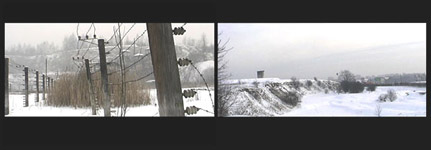
Omer Fast
Spielberg’s List (2003) presents the testimony of ‘survivors’
of Schindler’s List, Polish extras who took part in the
shooting of Steven Spielberg’s Oscar-winning 1993 film. They describe
their experiences alongside footage of the concentration camp site and
the film-set which was erected nearby. Some of the older participants
retell their experiences both of movie-making and of the Second World
War. Fast’s video installation disturbs the expectations conditioned
by the conventions of documentary film and the perceptions of history
conditioned by the film industry.
*1972, Israel, Omer Fast lives and works in Berlin.
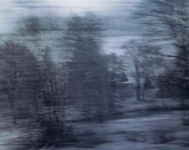
Ori Gersht
Gersht’s photography and video works focused on places and journeys
of personal historical significance often present the trace of a search
as much as the search for traces.
White Noise (1999) is a series of photographs recording Gersht’s
journey between Krakow, Auschwitz and Belzec. With open shutter pointing
out of the train window, Gersht’s personal act of remembrance records
no intelligible image, no recognisable place, no forest or snowy landscape.
*1967, Israel, Ori Gersht, lives and works in London.
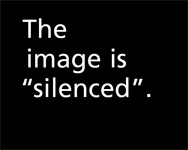
Klub Zwei
Black and White: the other side of images (2003) is a commentary
on the use and misuse of images presented as historical documents. Examining
the contexts and captions which lend meaning to photographs or burden
them with associations which the pictures cannot necessarily sustain,
the video shows only black or white: white text on a black screen with
statements such as ’the image is “silenced” ... it looses
its power to speak’, and, over a white screen, the voice of an archivist
discussing the implications of how photographs are published and collected.
Since 1992, Klub Zwei is Simone Bader and Jo Schmeiser. Klub Zwei live
and work in Vienna.
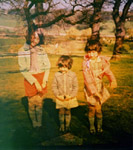
Miranda Lopatkin
Miranda Lopatkin's multi-layered photographs highlight the artist’s
concern with the passage of time, the distortion of memory and the processes
of cultural assimiliation. The Family Danced (2004) explores
the realm of memory where facts fade, where the familiar becomes unfamiliar.
Figures merge into their surroundings and their backgrounds become camouflage.
*1977, UK, Miranda Lopatkin lives and works in London.
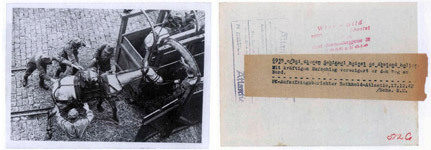
Ann-Sofi Sidén
Poshlust! A Quest for White Horses (2003) is a series of 14 found
photographs: images from the 1930s and 40s, each depicting a white horse
amid banal or frightful moments in the unfolding of the Second World War.
Alongside the white horses, Sidén presents the reverse sides of
these images recovered from press agency archives on this apparently arbitrary
criterion. Using the same form of facsimile used for reproducing the pictures,
Sidén discloses the captions, conditions and marks of ownership
inscribed on the backs of the images.
*1962, Sweden, Ann-Sofi Sidén lives and works in Berlin and Stockholm.
Thanks
Voluntary Memory is supported by Arts Council of England, Austrian Cultural Forum London, European Association for Jewish Culture, Embassy of Israel
Special thanks to the artists and:
Anthony Auerbach (London)
Elizabeth Fisher (Kettle’s Yard, Cambridge)
Sara Henkin (YaD Arts, London)
Christine König Galerie (Vienna)
Andrew Mummery Gallery (London)
![]()
![]()
![]()
![]()
![]()
![]()